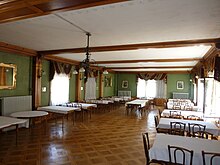Posthotel Loewen
The Posthotel Löwen is located in Mulegns in the Swiss canton of Graubünden . The hotel on the route on the Julier Pass is a contemporary witness from the time of the stagecoach, when up to 22,000 travelers stayed at the “Löwen” every year. The hotel was reopened on July 4, 2020.
history
The history of the hotel goes back indirectly to the eruption of the Tambora volcano in Indonesia in 1815. The ash clouds thrown up darkened the sky in Europe and led to widespread crop failures and famine; food had to be imported from Italy. In order to be able to transport these better and faster, the driveway over the Julier was enlarged to a width of five meters.
During the expansion, a Peter Balzer-Wasescha came to Mulegns. He recognized the potential of the vacant wooden house, bought it and between 1825 and 1835 built the “Posthotel Löwen” on its foundations. Next to the hotel he built stables for horses and coaches for carriages. 40 travelers and up to 80 horses could be accommodated.
After Peter Balzer's death in 1845, after several tenants, his son Christian took over the business together with his wife Regine Bieler in 1862 at the age of 21. Business went so well that an annex was added to the building in 1897; the Art Nouveau room in it is still preserved today. Christian Balzer died in 1912; his son Ernst continued to run the hotel.
The "lion" reached its heyday with the emergence of spa tourism in the Engadine . In order to acclimatize to the local altitude of 1,800 meters, the travelers sometimes interrupted their journey in the lower Mulegns. The prominent guests at the “Löwen” included Albert Schweitzer , Wilhelm Conrad Röntgen , the Archbishop of Milan, who later became Pope Paul VI. and Princess Mary , the great-grandmother of Prince Charles .
The decline came with the opening of the Albula line of the Rhaetian Railway in 1903. Overnight stays fell from more than 22,000 in 1900 to 1,527 in 1908.
In 1932 Alois Willi took over the "Löwen" from Christian Balzer's heirs and married the daughter of the room, Anna Poltera. In 1950 he bought the hotel and housed the workers employed in the construction of the dam of the Marmorera reservoir . After Alois Willi's death in 1959, the “Löwen” was continued by his widow Anna Willi and their five children.
Until 2000, the hotel was run all year round by Alois Willis' daughter Donata Willi; today she still runs it as a bed and breakfast hotel with 40 beds . The guests are mainly hunters, hikers and mountaineers.
The association “Projekt Posthotel Löwe, Mulegns”, founded in 2010, plans to take over the hotel and implement a project for the professional and social integration of young adults with difficulties. At the same time, the hotel and catering business is to be revived. A feasibility study was commissioned by the Bündner Heimatschutz .
The hotel reopened on July 4th, 2020.
literature
- Terra Grischuna , 4/2010
- Ludmilla Seifert-Uherkovich: The "lion" in Mulegns , in Bündner monthly newspaper 3/2012, pp. 300–333
- Basil Vollenweider: Post Hotel Löwe: From the beginnings of tourism to the First World War. Research on the history of the Post Hotel Löwe in Mulegns . Origenal, Vol. VIII. Verlag Nova Fundazion Origen, Riom 2019. ISBN 978-3-9525163-1-7 .
Web links
Individual evidence
- ↑ Homeland Security
- ↑ Origen Festival Cultural: Hotel Löwe Mulegns. Retrieved July 6, 2020 .
Coordinates: 46 ° 31 '26 " N , 9 ° 37' 14.6" E ; CH1903: 767 413 / 154838



